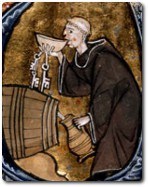The Pardoner's Prologue and Tale Contents
- Social / political context
- Religious / philosophical context
- Literary context
- l.1-40: The link between The Physician's Tale and The Pardoner's Prologue
- The Pardoner's Prologue - l.41-100
- The Pardoner's Prologue - l.101-138
- The Pardoner's Prologue - l.139-174
- The Pardoner's Tale - l.175-194
- The Pardoner's Tale - l.195-209
- The Pardoner's Tale l.210-300: Gluttony and drunkenness
- The Pardoner's Tale l.301-372: Gambling and swearing
- The Pardoner's Tale l.373-422: The rioters hear of death
- The Pardoner's Tale l.423-479: The rioters meet an Old Man
- The Pardoner's Tale l.480-517: Money
- The Pardoner's Tale - l.518-562: Two conspiracies
- The Pardoner's Tale - l.563-606: Love of money leads to death
- The Pardoner's Tale l.607-630: Concluding the sermon
- The Pardoner's Tale l.631-657: Selling relics and pardons
- Final link passage l.658-680: Anger and reconciliation
Food and drink
The importance of food and drink in the narrative is foregrounded by Chaucer in the Link, since the Pardoner is not even able to start without being able to:
Food
In the Pardoner's tirade against greed, the words for food, eating, glutton and gluttony occur fifteen times in the space of 105 lines (l.194-301).
Other references to food and appetite include:
- The Pardoner's own voracious greed that leaves others hungry – though he is taking these products for their potential monetary value — not to eat himself, of course:
‘I wol have … chese and whete
Al were it yeven … of the poverest widwe …
Al sholde hir children sterve for famyn.' (l.160-3) - The mention of how he ‘saffron'[s] his preaching with Latin words (like sprinkling the exceedingly expensive spice saffron in cooking) to make an impression
- The Pardoner's familiarity (like Chaucer) with ‘Fisshestrete, Chepe', the main shopping streets of the City of London (l.276).
Drink
 In the Pardoner's homily against gluttony and alcohol, the words drink, drunk and drunkenness occur fourteen times in the space of 97 lines (l.196-293). Throughout, he demonstrates the negative effects of drinking too much.
In the Pardoner's homily against gluttony and alcohol, the words drink, drunk and drunkenness occur fourteen times in the space of 97 lines (l.196-293). Throughout, he demonstrates the negative effects of drinking too much.
Apart from this catalogue, there are a number of other references to alcohol and its consumption:
- The Pardoner mentions his own desire for ‘licour of the vyne' (l.164)
- This echoes the Host's need for ‘a draughte of moist and corny ale' (l.27)
- The three youths habitually ‘drinke over hire might' (l.180) and revel in ‘wyn' (l.196)
- They are shown to be already ‘set … in a taverne to drinke' (l.375) by six in the morning and their pursuit of Death is undertaken ‘al drunken in this rage' (l.417)
- Chaucer's familiarity with the wine trade shines through the Pardoner's scorn at how both ‘whyte and rede' wine is adulterated, mixing cheap wine from ‘Lepe' in Spain with expensive French types from ‘Rochele' and ‘Burdeux', and the ‘fumosite' this produced (l.275-84).
The ending of the account of the rioters literally demonstrates that drink is the death of them:
- The plot against the youngest can only be hatched because they are all desperate for a drink while they wait for nightfall and he undertakes the errand
- The older two are poisoned because they are unable to get on with the job in hand without needing to ‘sitte, and drinke, and make [them] merye' (l.595)
- The fact of the youths literally being poisoned by drinking reinforces the Pardoner's point about the morally poisonous effects of alcohol.
Most important was the danger that excess drink (and food) posed to people spiritually. This was because of the way it ‘killed' the soul and mind, helping to imprison the person in the material — dead — world.
Chaucer's satire
That Chaucer condemns the desire for increasingly elaborate food among the upper and aspiring middle classes is clear in l.250-8. The text paints mocking pictures of aspects of fashionable cuisine:
- Instead of eating food in its natural state, cookery involves absurd amounts of labour (cooks ‘stampe, and streyne, and grynde') and turns the simple nature of the foodstuff into the appearance of something else
- Cooks crack open marrow bones to extract the rich and delicious — but sparse — marrow at the heart of the bone (l.253-4). The gourmet demands that his sauce shall be composed of herbs (leef), spice barks (like cinnamon) and roots (like ginger). Spiced sauces were fashionable and spices were very expensive (l.256)
- These spiced delicacies are needed because the gourmet's appetite is jaded. Such artificial food is not serving a simple, natural hunger
- The use of the word ‘confiture' in l. 574 for the poison obtained by the youngest rioter is an interesting choice, as it usually referred to a mixture containing several ingredients (the term is applied today to high class jam) – there is the association of adulterated foodstuffs and death.